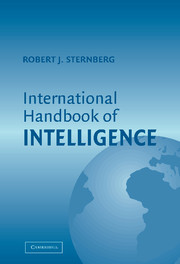Book contents
- Frontmatter
- Contents
- List of Contributors
- Preface
- 1 Intelligence Research and Assessment in the United Kingdom
- 2 Intelligence – Theory, Research, and Testing in the Nordic Countries
- 3 The Psychology of Human Intelligence in Spain
- 4 Psychology of Human Intelligence in France and French-Speaking Switzerland
- 5 Research on Intelligence in German-Speaking Countries
- 6 Is It Possible to Study Intelligence Without Using the Concept of Intelligence? An Example from Soviet/Russian Psychology
- 7 Intelligence Theory, Assessment, and Research: The Israeli Experience
- 8 Intelligence and Intelligence Testing in Turkey
- 9 Intelligence: What Is Indigenous to India and What Is Shared?
- 10 Japanese Conception of and Research on Human Intelligence
- 11 Diligence Makes People Smart: Chinese Perspectives of Intelligence
- 12 Similar Thoughts under Different Stars: Conceptions of Intelligence in Australia
- 13 Being Intelligent with Zimbabweans: A Historical and Contemporary View
- 14 Intelligence Research in Latin America
- 15 North American Approaches to Intelligence
- 16 Human Intelligence: From Local Models to Universal Theory
- Index
- References
14 - Intelligence Research in Latin America
Published online by Cambridge University Press: 05 June 2012
- Frontmatter
- Contents
- List of Contributors
- Preface
- 1 Intelligence Research and Assessment in the United Kingdom
- 2 Intelligence – Theory, Research, and Testing in the Nordic Countries
- 3 The Psychology of Human Intelligence in Spain
- 4 Psychology of Human Intelligence in France and French-Speaking Switzerland
- 5 Research on Intelligence in German-Speaking Countries
- 6 Is It Possible to Study Intelligence Without Using the Concept of Intelligence? An Example from Soviet/Russian Psychology
- 7 Intelligence Theory, Assessment, and Research: The Israeli Experience
- 8 Intelligence and Intelligence Testing in Turkey
- 9 Intelligence: What Is Indigenous to India and What Is Shared?
- 10 Japanese Conception of and Research on Human Intelligence
- 11 Diligence Makes People Smart: Chinese Perspectives of Intelligence
- 12 Similar Thoughts under Different Stars: Conceptions of Intelligence in Australia
- 13 Being Intelligent with Zimbabweans: A Historical and Contemporary View
- 14 Intelligence Research in Latin America
- 15 North American Approaches to Intelligence
- 16 Human Intelligence: From Local Models to Universal Theory
- Index
- References
Summary
INTRODUCTION
How do we explore a territory for which there are no maps available? This difficulty, faced by Spanish and Portuguese conquerors attempting to explore and dominate Latin America during the 16th century, is similar to that faced by the author of this chapter in finding out what has been researched in the region on the topic of intelligence. Where does this difficulty lie? On one side, in the insufficient development of the discipline in the region, and on the other, closely related to the former, in the scarce development of means of scientific communication that could contribute to the dissemination of the work being carried out.
Latin America includes 25 countries and two associated states. It counts only three psychology journals indexed in the Institute for Scientific Information (ISI) (Revista Latinoamericana de Psicología, Revista Mexicana de Psicología, Revista Interamericana de Psicología) and one non-indexed but recently included in PsycInfo (Revista Psykhe). Most of the countries in the region have begun to offer psychology as a major in their universities only within the last three decades (Toro & Villegas, 2001). Only Mexico, Brazil, and Chile have Ph.D. psychology programs that are competitive at an international level, all of them developed very recently. In other words, there is not a consolidated development of the discipline in the region, and there are not enough means of scientific dissemination.
- Type
- Chapter
- Information
- International Handbook of Intelligence , pp. 391 - 410Publisher: Cambridge University PressPrint publication year: 2004
References
- 2
- Cited by



